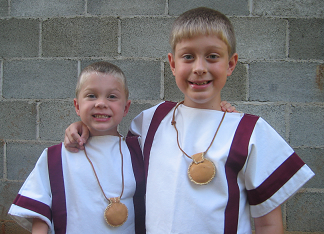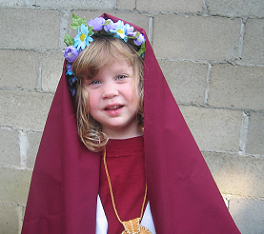Ludi Matutini 2761 AUC (Nova Roma)
(update info) |
(content) |
||
| Line 121: | Line 121: | ||
'''Ludi Matutini Awards:''' | '''Ludi Matutini Awards:''' | ||
| − | * Certamen Historicum Winner: | + | * Certamen Historicum Winner: '''NO ENTRIES''' |
| − | * Conjectura Pedifollina Winner: | + | * Conjectura Pedifollina Winner: '''NO ENTRIES''' |
| − | * Literary Contest I (Poem) Winner: ''' | + | * Literary Contest I (Poem) Winner: '''[[Ludi Matutini 2761 AUC (Nova Roma)/Literary Contest I/Winning Entry|RISE, PHOENIX!]] by Gaia Aurelia Falco Silvana''' |
* Literary Contest II (Essay) Winner: '''NO ENTRIES''' | * Literary Contest II (Essay) Winner: '''NO ENTRIES''' | ||
Revision as of 19:08, 31 July 2008
> > > > > LUDI MATUTINI GAMES PAGE FOR CHILDREN ~ CLICK HERE < < < < <
Contents |
Ludi Matutini, the 4th of 2761 Ludi Decennales
The Ludi Matutini is the 4th set of games in the tenth anniversary year series of games, designated as Ludi Decennales. We invite you to take part in and enjoy each and every contest, and to celebrate each Ludi and Festival in the spirit of the ancient Romans!
Why highlighting children, here?
On June 11th, Mater Matuta is celebrated. This is the day of Matralia, when a very old ceremony involved patrician women who welcomed slaves in a sanctuary before chasing them from it. It was a symbolic ritual in which these women were supposed to be the Dawn, the rising sun chasing darkness from the sacred area. These women were then called "aunts" who were to protect their sisters' children. They were symbolizing Matuta, the aunt, protecting the Sun (the niece), and her children, at the same time the coming days until the solstice, the humans and their children.
Like the coming days, our children and every child must be watched upon, and loved.
Ludi Matutini meaning
Our Ludi come at another very special time in the old Roman calendar. These are those days, less than two weeks before the summer solstice, where the sun is getting stronger, the days longer, but at the same time where both are to be stopped, in their development, by the solstice. After June 21st, and even if we live more than two months of summer, sun and days will loose their fight against moon and night.
Thus, these Ludi Matutini will celebrate these days when men, and specially Romans, are conscious of the necessity to contribute to the last efforts of the sun, and, generally speaking, of the fire, of the coming fire.
The first of our three days will thus first honor Vesta (9th June), our goddess of the eternal fire, which keeps the homes during day and night, and whatever the season. Vesta is Jupiter's elder sister, and daughter of Chronos and Cybel, the Magna Mater. First of all the gods and goddesses involves during these three days, Vesta is particularly appreciated for the constant flame that she watches upon.
Second, we have to honor through Sol indigenus, one of the oldest roman gods, or through Mithra, the late eastern divinity entered in the Roman pantheon, the deity of the sun. Though this deity is generally forgotten behind the other gods who have taken, for their benefit, solar characteristics, it remains one of the major genuine Roman deity.
Third, Matuta, and in second rank Fortuna, is the goddess who we dedicate the Matralia, on the third day of our Ludi, the ancient Matralia. Matuta is the goddess of dawn, i.e. of the coming sun, who has fought against the darkness, and of every coming, rebirth, or renewal. The fact that Marcus Furius Camillus, said by Livy as deserving to be considered after Romulus as the "second founder of Rome", has seen his life placed, on several times, under dawn and rising sun protection is thus significant. Matuta was thus linked to Ianus and Portunus, and so also lived as one of the gods who protected the harbors.
Fortuna has been here added beside Matuta, to remind that, beyond the nature regular circles, human life is subject to a destiny that is not entirely controlled by the gods, and that Humans may honor to get a better life. Fortuna, who is celebrated in two weeks, on June 24 th, must, at last, never be ignored during Ludi !
Consult in addition
The Aedes Vestae virtual reconstruction: [1]
Visit the London Mithraeum with Nabarz! MITHRAS VIDEO
Tour the Virtual Mithraeum in Britannia VIRTUAL MITHRAEUM
Look at the temple of Fortuna Huiusce Diei in Rome [2]
Make a virtual pilgrimage to the famous Temple of Fortuna in Praeneste, the largest temple complex in Republican Rome [3]
Visit virtual Rome!
Virtual Rome
Our ludi golden rule: one day, one god, one ludus: Ludi Matutini Schedule: 3 days (Jun. 9, 10, 11)
DAY I ~ a.d. V Id. Iun. ‡M. Moravio T. Iulio cos. ‡ MMDCCLXI a.u.c. (June 9, 2008 CE)
- VESTALIA
- Honored Diety: VESTA
- Opening Ceremony
- Conjectura pedifollina (de certamine gentium europaeo 2761 auc): Dacia-Gallia : give the final score! (deadline hour: 17:30 Rome time!!)
- Ludi Circenses Quarters
- Conjectura pedifollina (de certamine gentium europaeo 2761 auc): Batavia-Italia give the final score! (deadline hour: 20:30 Rome time!!)
- Certamen Historicum (Spartacus)
- Literary Contest I ~ Rules and Program (results on Idus, June 15)
DAY II ~ a.d. IV Id. Iun. ‡M. Moravio T. Iulio cos. ‡ MMDCCLXI a.u.c. (June 10, 2008 CE)
- Mithras was a mystery cult imported from the East, Persia and has strong connection due to solar imagery with Sol Invictus and Christianity. The mystery religion of Mithras was extremely popular with legionaries and peaked in the 3rd Century C.E. You can find inscriptions to Mithras from Hadrian's Wall to Londinium; all through Britannia.
- Conjectura pedifollina (de certamine gentium europaeo 2761 auc): Hispania-Sarmatia : give the final score! (deadline hour: 17:45 Rome time!!)
- Ludi Circenses Semi-Finals
- Conjectura pedifollina (de certamine gentium europaeo 2761 auc): Graecia-Thule : give the final score! (deadline hour: 20:30 Rome time!!)
- Certamen Historicum (Spartacus) (results on Idus, June 15)
- Literary Contest II ~ Rules and Program (results on Idus, June 15)
DAY III ~ a.d. III Id. Iun. ‡M. Moravio T. Iulio cos. ‡ MMDCCLXI a.u.c. (June 11, 2008 CE)
- MATRALIA
- Honored Dieties: MATUTA, FORTUNA
- Conjectura pedifollina (de certamine gentium europaeo 2761 auc): give the eight teams qualified for 1/4 Finals (deadline hour: 17:45 Rome time!!)
- Ludi Circenses Finals
- Conjectura pedifollina (de certamine gentium europaeo 2761 auc): give the two finalists teams (deadline hour: 20:30 Rome time!!)
- Photo/Video Contest ~ Rules and Program (results on Idus, June 15)
- Closing Ceremony
Results
Ludi Matutini Awards:
- Certamen Historicum Winner: NO ENTRIES
- Conjectura Pedifollina Winner: NO ENTRIES
- Literary Contest I (Poem) Winner: RISE, PHOENIX! by Gaia Aurelia Falco Silvana
- Literary Contest II (Essay) Winner: NO ENTRIES
- Photo/Video Contest Winner: NO ENTRIES
- Ludi Circenses Victor: SYNTARSUS, sponsored by Gaia Aurelia Falco Silvana
- Children's Picture Contest Winner: NO ENTRIES
Historical Pages > Historical Pages
Master Index > English > Nova Roma > Civic life (Nova Roma) > Events for Romans > Ludi (Nova Roma)
Master Index > English > Nova Roma > Nova Roma History
Master Index > English > Nova Roma > Res publica (Nova Roma) > Magistracies (Nova Roma) > Curule Aediles
Master Index > Maintenance Categories > Pages to be deleted > MMDCCLXI



